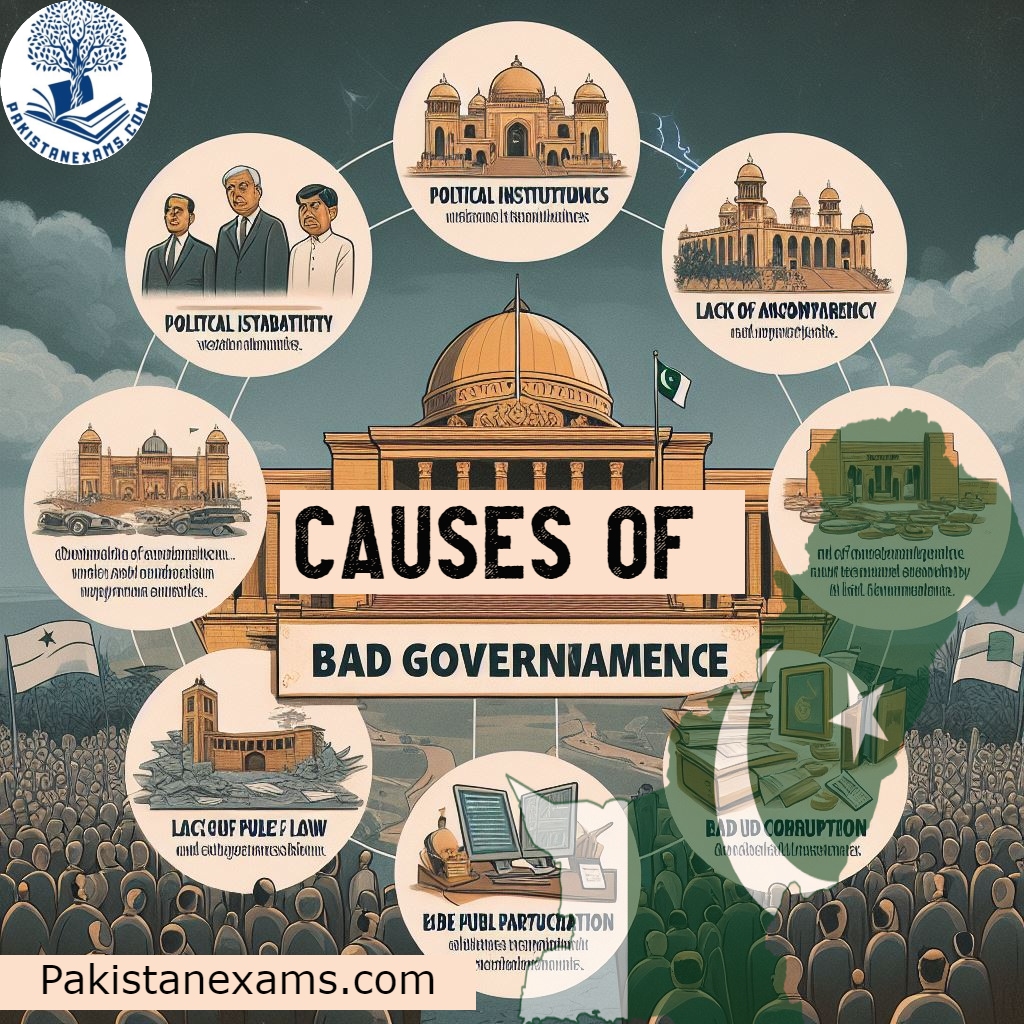Introduction to Governance and its Elements
Governance is all about how decisions are made and carried out. It’s built on five main pillars:
- Transparency: This is like an open-door policy, where everything about decision-making is clear and out in the open.
- Accountability: This means that those who make decisions have to answer for their actions and can’t just do whatever they want without explanation.
- Participation: This encourages everyone affected by decisions to have a say and be involved in the process.
- Rule of Law: This ensures that all decisions are made according to established laws and not just on a whim.
- Effectiveness: This is about making sure that the decisions made, actually work and bring about the results they’re supposed to.
When these elements are in place, governance is strong, which helps build trust among people, maintains stability, and supports the growth and development of the country.
Causes of Bad Governance in Pakistan
Bad governance is caused due to the lack of these mentioned elements. It’s what, that has happened in Pakistan, which has caused bad governance in the country. The causes of bad governance in Pakistan are given below:
Political Instability
Frequent changes in government and leadership due to military coups, weak democratic institutions, and historical political unrest have caused political instability in Pakistan. These disruptions have delayed long-term planning and policy continuity, contributing to instability in governance.
Weak Institutions
Inefficient state institutions play a significant role in bad governance. Factors include a lack of capacity, inadequate resources, and political interference. Moreover, governance, law enforcement, and public service delivery institutions often lack the necessary infrastructure, human resources, and effective leadership in the country.
Lack of Accountability and Transparency
There are insufficient mechanisms for holding public officials accountable in the country. This allows corruption and misuse of power to persist unchecked. On the other hand, transparency in decision-making, public expenditure, and policymaking is also lacking. Consequently, eroding trust in government and public institutions, resulting in bad governance in the country.
Lack of Public Participation
There are limited opportunities for meaningful public involvement in governance processes in Pakistan. Therefore, the citizens’ voices are marginalized, leading to disengagement between the government and the people.
Bad Rule of Law
Weak enforcement of legal frameworks perpetuates bad governance. Additionally, the inconsistent application of laws, judicial delays, and limited access to justice weaken the legal system in the country. Hence, the lack of adherence to the rule of law fosters a culture of bad governance in Pakistan.
Corruption
Widespread corruption at various levels affects the effectiveness of governance. Corruption diverts public resources, distorts policymaking, and erodes public trust. In addition, corruption hinders service delivery in the country.
Conclusion
In conclusion, comprehensive reforms are needed across political, institutional, legal, and societal dimensions to address bad governance in Pakistan. Strengthening democratic institutions, promoting transparency, ensuring accountability, empowering citizens, and combating corruption are crucial for sustainable development and good governance.
Test your knowledge:
Dear reader, governance is an important topic of current affairs, therefore you should understand it. Attempt the given questions to check your knowledge of the topic.
- What is governance and what are its elements?
- Explain the causes of bad governance in Pakistan.


2 thoughts on “Governance and Causes of Bad Governance in Pakistan”